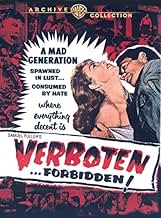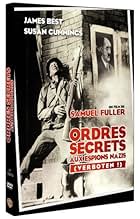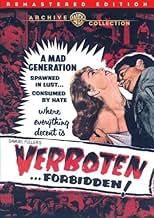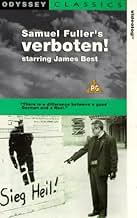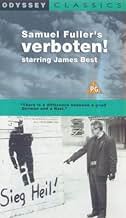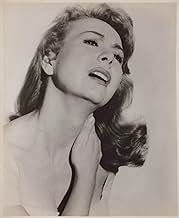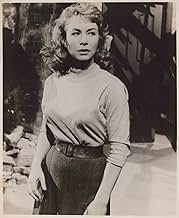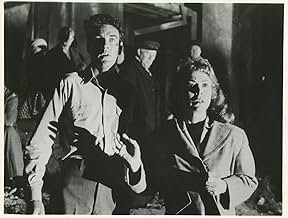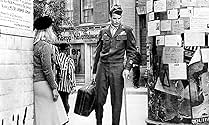Ajouter une intrigue dans votre langueA young American serviceman stationed in Germany after the fall of the Third Reich jeopardizes his position with the Marshall Plan relief effort by breaking the non-fraternization rule and f... Tout lireA young American serviceman stationed in Germany after the fall of the Third Reich jeopardizes his position with the Marshall Plan relief effort by breaking the non-fraternization rule and falling in love with a young German woman. He uses his position to obtain food and luxuries... Tout lireA young American serviceman stationed in Germany after the fall of the Third Reich jeopardizes his position with the Marshall Plan relief effort by breaking the non-fraternization rule and falling in love with a young German woman. He uses his position to obtain food and luxuries for her that are in short supply, and all seems to be going well for the couple. What he ... Tout lire
- Infantryman
- (as Joseph Turkel)
- Self
- (images d'archives)
- (non crédité)
- Self
- (images d'archives)
- (non crédité)
- Self
- (images d'archives)
- (non crédité)
- Self
- (images d'archives)
- (non crédité)
Avis à la une
Basically a love story between a GI and German woman the movie goes a lot deeper into the disenchantment of the German people back in 1945 who felt that their being slowly driven to mass starvation by the occupying US military. Being saved from being shot on the spot by the advancing Waffen SS by a German girl Helga, Susan Coming, GI Sgt. David Brent, James Best, later marries her after the war; even though it's forbidden by the US Military Occupying Gvernment for Americans to fraternized with the local German population.
David getting a job in the food distribution section of the US 45th Infantry Division which incidentally had an Indian Nazi-like swastika as it's combat symbol, until 1940 when it was changed to a Thunder-bird, has no trouble getting his wife and her infirmed mother Frau Schiller, Anna Hope, and younger brother Franz, Harold Daye, all the food and medicine that they need. But the other Germans in the little town of Rothbach are on the brink of revolt due to the corruption and black-market racketeering by Americans and their hand-picked Germans employees handling the desperately needed supplies.
With the defeated and disbanded Nazis seeing a chance to regain power they start to form guerrilla-like units, among the German Hitler youth and Army POW's, called werewolves that create havoc, much like whats happening today in Iraq, among the US forces in the German Bavarian province where Rothbach is located. The head of the local werewolf unit is Helga's childhood friend Bruno, Tom Pittman, who's both a fanatical Nazi as well as working undercover, for the werewolves, for the US Military Government in town.
Bruno recruits young Franz into the werewolves who at first is very eager to fight for his country against the hated occupying US military. Later when his older sister Helga takes Franz to the Hall of Justice in Nuremberg to see the top Nazis standing trial, and films of what their accused of doing, he quickly changes his mind and turns against Bruno. Bruno who seemed to care even less about his fellow Germans then US military is exposed as a ruthless exploiter of his own people by fellow werewolf Helmuth, Dick Kallman. Thats when Helmuth found out that Bruno was using the werewolves to pompously, by blowing up supply trains, keep much needed medical equipment and drugs from the people in Rothbach. Thus making it look like the US was doing it in order to get them to revolt against the Americans.
Having Helmuth, on the orders of Bruno, beaten tried and executed for treason right in front of him has now the very troubled, as well as enlightened, Franz decide to get a hold of the secret papers that Bruno has that are plans to take over Germany through a nation-wide werewolf guerrilla war. With all this going on Bruno also takes the time to break-up Helga, who's now pregnant, and Davids marriage by telling David that Helga doesn't love him and only married David to get him to give her and her mother and brother free food and shelter.
A bit uneven in parts with the movie trying to balance a love story with a post-war thriller. For a time you almost forget that Helga is even in the movie with it totally focusing on the werewolf movement and when Helga later takes young Franz to Nuremberg it took a while to realize just who she was, David's wife, since you had the impression that she was somehow killed off earlier in the film. James Best as Sgt. David Brant was by far the best actor in the movie, with Tom Pittmans Bruno Eckart a close second. Bests confrontation with Helga towards the end of the film over her taking advantage of him, which turned out to be a big lie made up by Bruno, was as effective emotionally charged and on par with Marlon Brando's electrifying performance in "Streetcar Named Desire".
It might lead one to believe that this will be a somewhat conventional WW2 flick (somewhat in that one usually wouldn't find Beethoven and, later on to an extent, Wagner put into these images), but this isn't the case. Instead, Fuller makes this a 'Coming Home' kind of movie, though not at all in the sense that 'this soldier comes home injured and so on and so on'. Instead of really going home, Brent stays on in Germany, as he's fallen head over heels for the woman, Helga (Susan Cummings, pretty good at pulling off the German accent), and wants to work in a smaller capacity in the military so he can marry her. What he doesn't realize is that a) she wants him more for money so she can get food for herself and brother, however this gets complex emotionally at the point of revelation to the slightly naive but heartfelt Brent, and b) there's an underground Hitler youth sect called the Werewolves, who want to pick right up off where Hitler ended- starting small, despite argument within the group- by attacking the very government that's now embedded in Germany to give them, as Brent describes, a "blood transfusion."
With this, plus footage from the Nuremburg trials, and (as narrated, I think, by Fuller himself) a quick, no-punches-pulled history of the Nazi war crimes piece by piece, we get a multi-faceted look at a society in the dire straits of an immediate post-war environment. While Rossellini handled it his own way with Germany Year Zero, Fuller tackles it with layers: first there's the love story, or what is the tragic downfall of a man who can't see anything past what he thinks should be reasonable, that it's his wife and a child on the way that he can't leave, until the revelation that he's (partly) been swindled. Baker and Cummings, along with Harold Daye as Helga's young, confused brother, perform at with the utmost detail to emotions; these aren't very easy B-movie parts, though they could've been that. Then another layer is the political one, the struggle of a society to come to grips with being conquered, and a mentality which is made sensationalized, to be sure, by Fuller, in respect to making the Nazi's a total no-gray-area thing: they're evil, particularly when they cancel out reason to meet their ends.
And finally there's the layer of style, which is strangely absorbing. This is probably one of Fuller's 'talkiest' films, which isn't a bad thing considering it's one of his best written scripts, as the characters don't talk simply or in too many platitudes (with the exception of a small scene where two characters talk about the Hitler youth as juvenile delinquents, which is actually, according to Fuller's autobiography, probably another layer to consider in the subtext and the 50s period of movies). And Fuller shoots this almost in a real European style, when he's not going for fight scenes or battles, as the editing isn't always very fast, and sometimes a cut won't happen for a full minute, or longer.
There's an odd tension that grows out of this, especially when there's something said by a character that gets another one wild-eyed or suspicious; Fuller could easily go for a big close-up, but there's a more sinister, cold quality to not moving away from two people in a conversation without a simple over-the-shoulder deal. But when it requires it, like the big brawl outside the American military office, or the Nuremburg footage spliced into Franz's memories of the Werewolves, Fuller can be as stunning stylist as ever.
Very hard to find, but extremely worth it if you'r either a fan of the director's or of WW2 movies set in Germany- or even just a history-buff- Verboten! is an intellectual experience and a strong emotional one, with a cast that is better than expected from a B-movie, and an attitude towards the 'other' that is equally damning and thought provoking.
Le saviez-vous
- AnecdotesThis was the last RKO project which began with the original radio-transmitter logo. Later movies from the revived RKO Pictures would start with a modern reproduction of the transmitter.
- ConnexionsFeatured in The Typewriter, the Rifle & the Movie Camera (1996)
Meilleurs choix
- How long is Verboten!?Alimenté par Alexa
Détails
- Durée1 heure 33 minutes
- Couleur
- Rapport de forme
- 1.85 : 1

